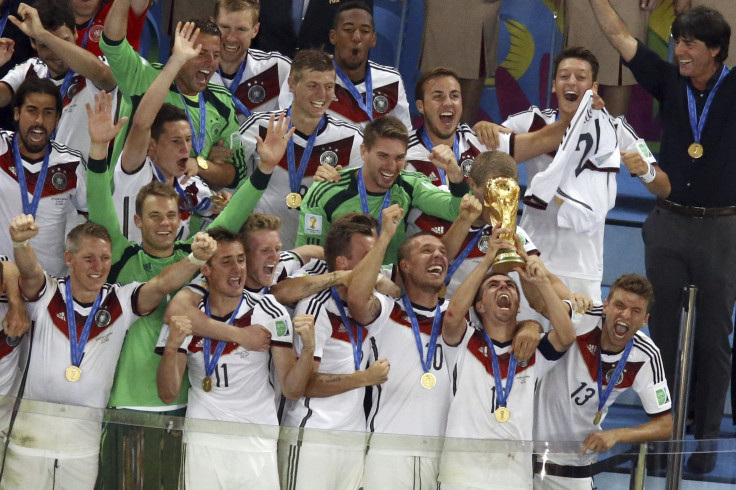Despite FIFA World Cup Controversy, US Still Wants To Host Soccer's Biggest Game

Recent World Cup bids have sparked fiery protests in the streets of Brazil against government spending, allegations of damning human rights violations in Qatar, and an international corruption scandal that put many of soccer's global leaders behind bars this week. And yet, even as FIFA's marquee event has become entangled in criminal allegations and reports of abuse, U.S. leaders are still as eager as ever to host a World Cup tournament and deal with all the headaches that come with it.
The motivation is not too hard to figure out. Soccer's biggest game means money, and the U.S. wants a cut. While hosting one of the world's most watched international athletic events can be an excessive expense for some nations with limited infrastructure, the U.S. stands to make a profit because it would take a relatively minor investment to prepare for the tournament, sports economists said.
“A World Cup in Russia, a World Cup in Qatar, a World Cup in Brazil is a huge disaster for the countries involved,” said Victor Matheson, an economics professor who focuses on sports at the College of the Holy Cross in Worcester, Massachusetts. "A World Cup in the United States ... would almost certainly be positive."
The U.S. Department of Justice indicted nine current and former FIFA officials along with five executives on Wednesday. Later, a Swiss investigation into the bidding processes for the 2018 and 2022 World Cups was announced in a statement.
The scandal seemed to bolster U.S fans’ hopes of a domestic World Cup via a re-located 2018 Russia tournament or 2022 Qatar tournament. But FIFA quickly shot the idea down. "Russia and Qatar will still be going ahead," said FIFA's director of communications and public affairs Walter De Gregorio Wednesday in a press conference.
The United States -- at least before the Justice Department charges -- was largely considered a favorite to win the 2026 World Cup bid. The United States already has myriad venues that could conceivably meet FIFA standards, including pristine NFL and college football stadiums. In the U.S. bid evaluation report for the 2022 World Cup, the 18 proposed stadiums required no additional construction plans, with just minor seating changes needed to meet FIFA requirements. The World Economic Forum competitiveness rankings pegged the United States at No. 12 in the world for infrastructure in 2014-15. Qatar ranked No. 24 and Brazil ranked No. 76.
"The U.S. has the facilities, and the cost of the U.S. hosting the World Cup would be relatively small," said Richard Sheehan, a sports economics professor at the University of Notre Dame in Indiana and author of the book "Keeping Score: The Economics of Big-Time Sports." “If you need to do any extensive venue creation or remodeling, then the revenue is probably not going to cover all of those costs."
Sheehan estimated the total price tag of hosting the World Cup could come in under $1 billion. That is starkly different than say -- Qatar -- which is reportedly spending about $200 billion on its World Cup games. That huge sum goes toward building transportation infrastructure, constructing stadiums and upgrading tourist facilities.
An October 2009 study released by the USA Bid Committee on the 2018 and 2022 World Cup concluded the tournament would have a $5 billion impact on the U.S. economy. The study, performed by an outside consulting firm, found that a World Cup could add an estimated $400-600 million to each host city.
U.S. Soccer Federation President Sunil Gulati said as recently as early April that a U.S.-hosted World Cup would be a benefit to not only the country, but also an already scandal-ridden FIFA. ''It's probably now at least as important for the international community to be in the United States as it is for the United States, in terms of hosting the World Cup,'' Gulati said, according to the Associated Press.
Former President Bill Clinton -- who served with the 2022 bid committee -- wanted the U.S. to host so desperately that he reportedly threw a tantrum and smashed a mirror when the bid lost to Qatar in 2014.
A U.S. tournament would perhaps look a lot like Germany’s 2006 World Cup, said Andrew Zimbalist, professor of economics at Smith College in Northampton, Massachusetts and author of the book "Circus Maximus: The Economic Gamble Behind Hosting the Olympics and World Cup.” The tournament was generally regarded as an economic success and brought in an estimated additional $2.65 billion for businesses. “Germany’s investment in hosting was minimal,” he said, unlike other countries which had to build stadiums that didn’t have a lasting use.
Brazil, on the other hand, reportedly spent $3.6 billion just to build and refurbish 12 stadiums and an estimated $11.3 billion total in public works for its 2014 World Cup.
For the U.S., worrying about such costs wouldn’t be an issue, Matheson noted. “Everyone should walk away making money on this,” he said
© Copyright IBTimes 2024. All rights reserved.






















